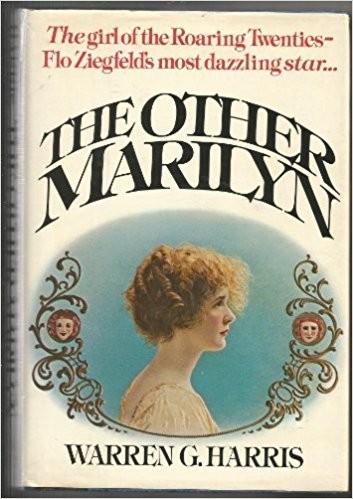Check nearby libraries
Buy this book

In the roaring, topsy-turvy decades between the First and Second World Wars, the name Marilyn and the initials MM signified only one luminary - Marilyn Miller. She was Broadway's premiere musical star, the prized creation of the Great Glorifier, Florenz Ziegfeld, the star of Hollywood extravaganzas, and America's adored, delicately beautiful angel. Warren G. Harris's fascinating biography of this largely forgotten first Marilyn re-creates a gaudy and glorious time in the American theater. It is peopled with names now legendary: Sigmund Romberg, Mary Pickford, Billie Burke, Clifton Webb, Eddie Cantor, Jerome Kern, Fred Astaire, Jack Warner, W. C. Fields, Fannie Brice, Moss Hart, and many others. Revue after dazzling revue was created for her, first by Lee Schubert, who made her a start when she was not yet sixteen, and the by Ziegfeld, who capitalized on her loveliness and her talent as a dancer, singer, and charmer.^
Her appearances on stage and off, her love life (actual and reputed), her clothes, her style, her marriages, her confrontations with Ziegfeld and others, were the stuff of daily news stories and breathless gossip. Behind the dazzlement lay a different story. The youngest child of a classic stage mother and a tyrannical stepfather who managed the family vaudeville troupe, Marilyn began performing when she was five, and spent her childhood on small-town stages across America and Europe. Stardom and wealth had their glories, but she worked brutally hard and her personal life was less than joyous. Her first husband was killed a year after their marriage. Married next to Jack Pickfair, she grew weary of his drinking. Her Hollywood career, briefly glorious, collapsed. Her third marriage to a man much younger than she brought no happiness; and she was haunted by the spectre of aging, of losing the beauty that was her hallmark. It did not happen; she was only thirty-seven when she died.^
No one who ever saw her, whether on stage in such productions as the Ziegfeld Follies, Sally, Sunny, Rosalie, and As Thousands Cheer, or in her films, ever forgot her ethereal loveliness. And for those who missed her, this biography restores to memory the star of a very special era in America's theatrical history. -- from dust jacket.
Check nearby libraries
Buy this book

Previews available in: English
| Edition | Availability |
|---|---|
|
1
The Other Marilyn: A Biography of Marilyn Miller
1985, Arbor House Pub. Co.
Hardcover
in English
0877955840 9780877955849
|
aaaa
|
Book Details
Classifications
The Physical Object
Edition Identifiers
Work Identifiers
Source records
Internet Archive item recordmarc_openlibraries_sanfranciscopubliclibrary MARC record
Library of Congress MARC record
Better World Books record
marc_columbia MARC record
harvard_bibliographic_metadata record
harvard_bibliographic_metadata record
Work Description
Marilyn Miller, that is--the beloved star of Broadway revues and 1920s musicals who died at age 37 in 1936. Harris (Gable and Lombard) follows Miller from her childhood, as the youngest member of a family vaudeville act (stage mother, tyrannical stepfather), to her discovery by Lee Shubert--which led to a solo turn in Broadway's Passing Show of 1914. (""Too early her career became her life."") Her sunny, dancing-singing appeal soon thereafter became one of Flo Ziegfeld's major attractions--in Sally, Sunny, and Rosalie; but though Flo obsessively doted on Marilyn, alternately feuding and fawning (""at times all but groveling at her tiny, size-one feet""), Harris scoffs at rumors of a Marilyn/Flo affair. (""There was no need for her to resort to sex as a bargaining tactic."") Indeed, Marilyn preferred younger men: after her brief, golden marriage to musical-comedy hero Frank Carter ended with Frank's auto-crash death, she went through assorted lovers--from syphilitic Jack Pickford (Mary's brother) to suave Jack Buchanan, from Jack Warner to Charles Lederer to ""handsome hunk"" Don Alvarado to chorus-boy Chet O'Brien, hubby #3. (As for her handpicked corps of male dancers, ""whether Marilyn was selecting them for sexual purposes as well is really impossible to know."") Her career started downhill about 1930, however--with a few Hollywood ups-and-downs, with less demand on B'way for Marilyn's unsophisticated musical-comedy style. And, despite a last hurrah in As Thousands Cheer, she ""simply lost the will to carry on"": after ""incompetent medical treatment"" (a botched sinus operation, improper drugs), she died from brain-swelling and toxically high fever. Throughout, Harris writes serviceably at best, with frequent lapses into fatuousness and vulgarity; his command of the Broadway/Hollywood-musical history involved often seems shaky; Marilyn herself, part child and part ""tough, foul-mouthed bitch,"" emerges neither in three dimensions nor very sympathetically. So this remains a show-biz bio of the most superficial, tacky sort--chiefly for devotees of 50-year-old gossip.
Community Reviews (0)
History
- Created November 14, 2017
- 12 revisions
Wikipedia citation
×CloseCopy and paste this code into your Wikipedia page. Need help?
| April 18, 2025 | Edited by MARC Bot | import existing book |
| December 10, 2023 | Edited by MARC Bot | import existing book |
| December 11, 2022 | Edited by MARC Bot | import existing book |
| February 28, 2022 | Edited by ImportBot | import existing book |
| November 14, 2017 | Created by ImportBot | Imported from Internet Archive item record |









